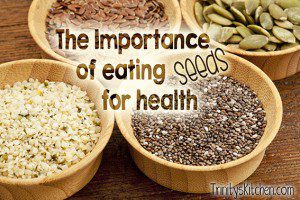Contributing Writer for Wake Up World
Seeds are an essential addition to any healthy diet – they aren’t usually as revered as nuts, although they certainly deserve to be. Filled with a beneficial compliment of essential fats, protein, a vast array of different nutrients and phytonutrients, they play an important role in supporting health. Seeds are the embodiment of universal life force; each seed, a little power house of massive potential, designed to grow into an impressive, abundant plant. They are simply bursting with goodness.
Seeds are an excellent alternative to nuts; often less rich (which I personally prefer) and easier to digest. You can find raw shelled seeds or seed-butters in any decent health store.
Nutritional benefits of seeds
[pro_ad_display_adzone id=”110028″]
Protein and essential amino acids Essential Fats
All seeds are high in essential fats. Flax, chia and hemp seeds come up top for omega-3 – an essential fat that is excellent for heart and brain function, often lacking in most diets. Hemp seed also has a perfect balance of omega 6 -to- omega 3, which is considered to be optimal by health experts.
Seeds are generally an excellent source of protein. Quinoa, amaranth, chia and hemp seeds are particularly noteworthy since they offer complete proteins, meaning that the contain all 9 essential fats required for optimal health. Using a balance of different seeds in your diet will also ensure a great supply of protein.
Nutrient dense
As well as protein, seeds a jam-packed with nutrients. Eating a variety of different seeds, over the course of your week, will ensure that you receive a healthy dose of phosphorus, magnesium, selenium, manganese, zinc, iron, copper, B vitamins, vitamin K and anti-oxidant rich vitamin E (and more). All of these nutrients are essential for supporting health on multiple levels.
Excellent source of fibre (fiber – US)
Like most plant based foods, seeds are naturally full of fibre. Fibre is good for blood sugar control, helping to slow the breakdown of carbohydrates and absorption of sugar. It is also great for promoting healthy bowel movement, heart health and weight-loss management.
Lower cholesterol and blood pressure
Seeds (to varying degrees) possess important cholesterol-fighting fibres known as lignans. Flax, chia and sesame seeds contain exceptionally beneficial levels – more than most other foods. Studies also show that this beneficial action from seeds can in turn lower blood pressure.
Antioxidant Rich Seeds
All seeds have a beneficial level of antioxidants, whilst some seeds are absolute powerhouses full of the stuff. Flax, is one of the highest rated antioxidants amongst plant foods, coming up top for polyphenols, which are super stars in the antioxidant world.
I am scratching the surface about the amazing benefits of seeds here in this article – I just wanted to hint at how essential they are in our food choices. Including a variety of seeds, in different forms, will help make sure that you are getting a well rounded compliment of nutritional benefits. Personally, I wouldn’t want to live with out them. As always, buy organic seeds.
Different ways to include seeds in your diet
Sprouted Seeds
Sprouting seeds tends to make the nutrients more readily available for absorption. Sprouting has the additional benefit of releasing the enzyme inhibitors within seeds making them more easy to digest. If you have my recipe book, then check out the raw sprouted sunflower seed pesto recipe – it’s so vibrant – one of my absolute favourite recipes. The unleashed life force from sprouting, creates such a vibrant and incredibly tasty dish.
Seed paste/butter
Another great way to speed up the release of nutrients is to enjoy them as a seed paste. In this way, the seeds are still whole (in that they have all of their parts included), although they’ve been broken down already, making the nutrients easier to absorb. You can easily buy seed butters in health food stores or if you have a food processor, you can even make your own. Tahini is a great example of a delicious sesame seed butter/paste (although taste varies a lot depending on which brand you buy, so be sure to explore and find a tasty one).
Ground seeds
Grinding your raw seeds makes for a good salad sprinkle or addition to a smoothie. Again, breaking them down in this way, means that you stand much more chance of absorbing the nutrients locked within the whole seeds.
Seeds that think they are grains
Quinoa and amaranth, whilst used as a grains are actually seeds! Quinoa and amaranth both contain a full compliment of essential amino acids, making it a discerning health seekers best friend. They are remarkably nutritious and can be used as gluten free ‘grain’.
Raw ‘as they come’ or roasted
Grabbing a handful of raw or roasted seeds as a snack or sprinkling on top of salads also works a treat too. Remember to chew your seeds well. Un-chewed seeds will just pass through your digestive system relatively whole; so enjoy the process of chewing your food properly to make the nutrients more available.
Baking with seeds
You can turn seeds into a meal/flour and use them as part of a baked recipe in place of breadcrumbs or flour. Baking really brings out their flavour and can help give a recipe a delicious taste. Baked whole seeds also make a delicious snack.
Seed oil
Seeds make excellent oils, often a little lighter than nut oil. Whilst I feel it is always best to enjoy a whole seed (one that still has all of it’s parts – even if ground down), oils still offer a great way to get a dose of essential fats in your diet. Hemp seed oil, and sunflower seed oil, are great examples that you might use as part of a salad dressing. Always choose the highest quality, cold pressed oil that you can find. Hemp oil is my favourite. It should actually taste good (it won’t taste good if you don’t buy a good one) and should have a green tint to it. Enjoy oil in moderation – a splash here and there, but don’t over do it.
Including more seeds in your daily culinary choices
Seeds have found a clever way to weave into my daily culinary choices in many different forms. I often start the day with a smoothie, that includes either ground hulled hemp seeds or tahini. I might enjoy a sprouted seed pate with lunch or a sprinkle of raw (or roasted) seeds on my salad. The dressing on my salad typically contains hemp seed oil, although I also use flax seed oil and sunflower seed oil too. My evening meal might easily contain quinoa, a seed roast or super healthy seed-veggie burger.
I have lots of seed recipes, some of which I’ve posted on my website. Here are some tasty recipe ideas using seeds:
A hearty, yet surprising light seed and carrot loaf, using complimentary herbs to bring the whole thing together. This works a treat if you are cooking up a special meal or looking for a nut roast/burger alternative. Great cold too.
A super easy, clever way to make seeds more-ish.
Roasting really brings out their flavour making a tasty snack for nibbling on; or a sprinkle for salads and soups.
Adding a tahini to a fruit smoothie slows down the rapid release of fruit sugars, meaning that it will sustain your for longer. Tastes excellent too. Check out this easy apple cinnamon smoothie with tahini.
One of my favourite ways to enjoy hemp oil, mixed up in a delicious salad dressing. It’s nice to make a batch of this up, so that you can use it on your salads all week long.
I just love mixing cooked quinoa in with salad. It makes for a whole and complete meal, full of premium protein, vitamins and minerals. This is a recipe for a delicious warming quinoa salad mixing cooked warm quinoa with vibrant raw ingredients.
Article Resources
Polyphenol content and antioxidant activity of several seeds and nuts
Ancient Foods That Are Still Nutritional Gems Today
More articles by Trinity Bourne:
- 10 Reasons Why We all Should be Eating Ginger – Recipes Included
- Top Tips for Making Deliciously Healthy Salads
- No-Bake Carrot Cake Recipe (Gluten Free & Vegan)
- The Health Benefits of Beetroot – Recipes Included
- Chickpea & Mushroom Burger Recipe (Vegan & Gluten-Free)
- Global Animal Industries – the Ghosts in Our Machine
- Foraging Guide – with 12 Nutritious Wild Plants That Anyone Can Find
- Keeping Slugs & Snails Off Your Veggies – Compassionately
- Chocolate Paradise Coconut Bar Recipe – Vegan, Raw, Absolutely Delicious!
- The Superfood Health Benefits of Celery (with Recipes!)
About the author:
 Trinity is an experienced, empathic energy worker and the author of ‘Trinity’s Conscious Kitchen’, a recipe book designed to inspire the soul through conscious vegan, wheat-free cuisine.
Trinity is an experienced, empathic energy worker and the author of ‘Trinity’s Conscious Kitchen’, a recipe book designed to inspire the soul through conscious vegan, wheat-free cuisine.
Around 18 years ago, during a profound spiritual awakening, the world around her shattered. She became engulfed in a white, universal, timeless, formless light until nothing else existed – other than the nameless truth at the core of all sentient beings. During this life-changing experience Trinity experienced the soul of all other sentient beings, trees, creatures, people as one pulsating energy. Transcending her into a higher realm of unity and oneness, this experience imparted a divine energy that she has been sharing through spiritual work ever since.
Understanding that the energy of our food directly impacts sentient life on all levels, Trinity founded Trinity’s Conscious Kitchen, a website devoted to inspiring the soul through conscious vegan cuisine. She is the co-founder of the Openhand Foundation, an organisation dedicated to the evolution of humankind. She works as the divine complement to her soul mate Open to help facilitate the global ascension process and feels incredibly blessed to be of divine service.
[pro_ad_display_adzone id=”110027″]







